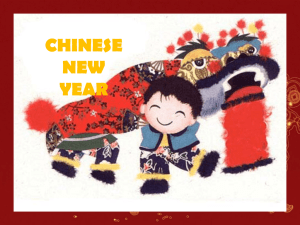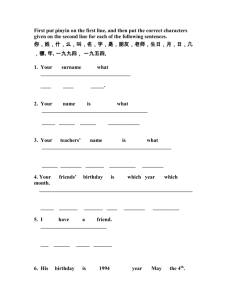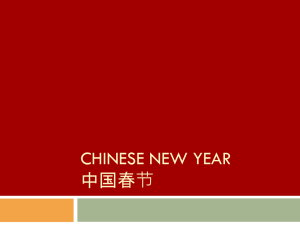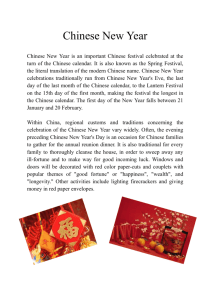哪天是中国的新年?
advertisement
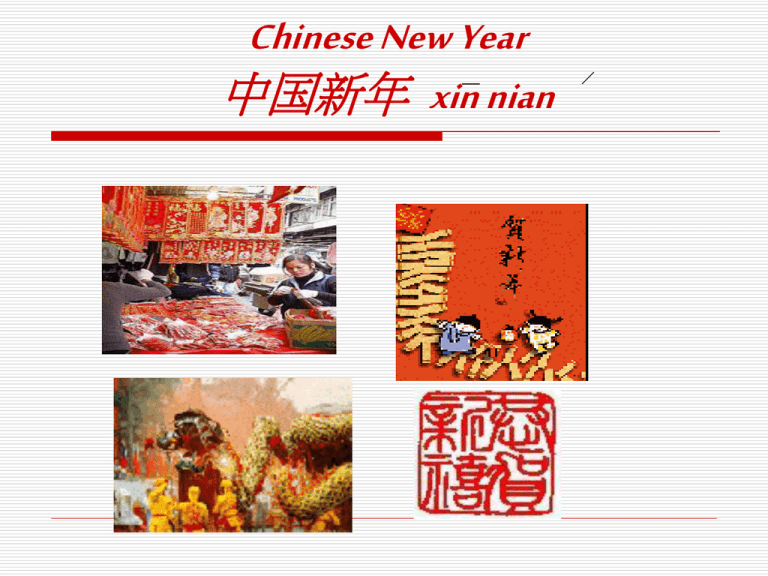
Chinese New Year 中国新年 xin nian tu 二0一一年是中国的兔年 中国的Zodiac 有十二只动物。它们是∶ Legend has it that the Lord Buddha summoned all the animals to come to him before he departed from earth. Only twelve came to bid him farewell and as a reward he named a year after each one in the order they arrived. xin 哪天是中国的新年? 兔年快乐! Chun jie hao 春节好! 二0一一年二月四 According to the Chinese 日是中国的新年。 Lunar Calendar, 2/4/11 is also the first day of Spring. 中 今年是兔年。 国新年也叫春节 (Spring l) Festival ) The Origin Of the Chinese New Year Celebration The Origin of 中国新年 celebration is too old to be traced, but manyof the colorful legends and traditions have something with a monstrous beast 叫 Nian。 Nian is cruel and ferocious, 很凶 that the ancient 中国人 believed would devour 男人和女人 on New Year’s Eve. To keep 年 away, red-paper couplets are pasted on doors, torches are lit and firecrackers are set off through the night, because Nain is said to fear the color red, the light of fire ,and loud noises. Early the next morning, as feelings of triumph and renewal fill the air at successfully keeping Nain away for another year, the most popular greeting heard is 恭喜 gong xi, or “congratulations”. 焰火 yuanhuo couplets Spring couplets are paper scrolls and squares inscribed with blessings and auspicious words, such as “good fortune” and “springtime. Couplet poems are written and pasted on the front door to scare away 年。 The paper squares are usually pasted upside down, because the Mandarin word for “upside down”, dao, is a homonym of the word “arrival”. 福 fu fortune The Chinese character upside down “倒” is a homophone with the character Arrival “到”。 by saying “your word is upside down”, you are also saying your “fortune arrives!” Many places are decorated with red and gold for good wishes for the New Year. Lanterns are lit for the night. 鱼 is a homophone with 余 yu, meaning surplus. By having fish on the dinner table, 有 鱼, people express their wishes that they will be doing so well for the year and they will actually have surplus. You often see fish associated with the new year celebrations. Chinese red envelopes Monetary gifts are usually presented in red envelopes during festive occasions, like weddings, birthdays, and the New Year. While their main task is to bear gifts, their second duty is to shower the recipient with luck, joy, and prosperity Taboos It’s unlucky to sweep the floor during the first five days of the Lunar New Year,because one might accidentally sweep one’s good luck and wealth out of the house. Bad language and talk of death are severely frowned upon. If a dish is broken,it’s vital to say “sui sui ping an” ,means every year will be safe and secure. On the first day of the Lunar New year Offering ritual homage to one’s ancestors. Reverence is then paid to the gods. New clothes are worn and visits are made to friends, neighbors, and relatives to exchange good wishes of “gong si fa cai”, which means “congratulations and prosperity”. 恭喜发财 All of Taiwan’s temples are usually very busy during this time of year as large numbers of people crowd into them with elevated incense sticks to pray for good luck. The Dragon And The Lion Dance One of the most spectacular sights during the Lunar New Year Festival is the dragon and lion dance. The heads of these fearsome beasts are supposed to ward off evil, and the nimble movements of the dancers provide a grand spectacle enjoyable to everyone. 兔年快乐!Tu nian kuai le 新年快乐!Xinnian kuai le 兔年好!Tu nian hao 过年好!Guo nian hao 恭喜发财!Gong xi fa cai 春节好!Chun jie hao 恭贺新禧!Gong he xin xi
